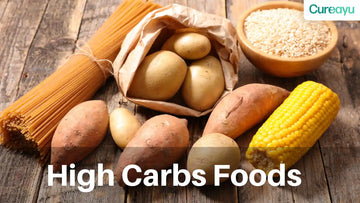Introduction Carbohydrates often get a bad rap in the world of dieting and fitness, but they are an essential component of a balanced diet. High-carb foods play a crucial role in providing the energy your body needs to function optimally. Whether you are an athlete, a busy professional, or a parent managing multiple tasks, carbs can be your best ally for sustained energy levels and mental focus.
Contrary to the myths, not all high-carb foods are unhealthy. Many are packed with essential nutrients like fiber, vitamins, and minerals that benefit your overall health. This blog will delve into the importance of carbs, how they can enhance your well-being, and highlight ten high-carb foods that should find a place in your diet.
Also Read: Food for Digestion: Navigating Digestion with the Art of Food Selection for Gut Harmony
What Is Carbs and Its Importance
Carbohydrates, often abbreviated as carbs, are one of the three primary macronutrients essential for human health, alongside proteins and fats. They are the body's main source of energy, broken down into glucose (sugar) during digestion and used as fuel by our cells, tissues, and organs.
Carbs are divided into two main types:
- Simple carbohydrates: Found in sugars and sweetened foods, they provide quick energy but lack significant nutritional value.
- Complex carbohydrates: Found in whole grains, fruits, and vegetables, they are rich in nutrients and offer sustained energy.
Importance of Carbohydrates:
- Provide immediate and long-lasting energy.
- Support brain function and mental clarity.
- Aid in muscle recovery after exercise.
- Help maintain a healthy digestive system through fiber-rich options.
- Are essential for the production of serotonin, which improves mood and reduces stress.
How Food Can Help?
High-carb foods, when chosen wisely, can support your body's energy needs and contribute to overall well-being. Complex carbs are particularly beneficial as they release energy slowly, helping you stay active throughout the day. Fiber-rich carbs also play a role in maintaining digestive health, managing blood sugar levels, and reducing the risk of chronic diseases like diabetes and heart disease.
Pairing high-carb foods with proteins and healthy fats can further enhance their benefits. For example, having oats with nuts or quinoa with vegetables creates a balanced meal that sustains energy and improves satiety.
Also Read: Food for Digestion: Navigating Digestion with the Art of Food Selection for Gut Harmony
10 High Carb Foods You Must Know
1. Bananas
Bananas are a quick and convenient source of carbohydrates. They contain natural sugars like fructose and glucose, which provide instant energy. Additionally, bananas are rich in potassium, making them an excellent choice for muscle recovery and maintaining electrolyte balance, especially after exercise. Bananas also contain vitamin B6, which supports brain health and helps regulate mood.
2. Beets
Beets are a unique high-carb food that provides both energy and numerous health benefits. They are rich in natural sugars and dietary nitrates, which improve blood flow and oxygen delivery to the muscles. Beets are also a great source of fiber, supporting digestive health. Additionally, their antioxidants, such as betalains, combat inflammation and oxidative stress, making them a heart-healthy choice.
3. Buckwheat
Despite its name, buckwheat is not related to wheat and is naturally gluten-free. It’s a powerhouse of complex carbohydrates and provides high amounts of fiber and protein. Buckwheat is also rich in antioxidants, magnesium, and manganese, promoting heart health and better blood sugar control. Its versatile nature allows it to be used in pancakes, noodles, and porridges, making it a nutritious addition to meals.
4. Oats
Oats are a staple breakfast food and a rich source of complex carbohydrates. Packed with beta-glucan, a type of soluble fiber, oats help lower cholesterol and maintain stable blood sugar levels. They are versatile and can be used in porridges, smoothies, and baked goods. Additionally, oats are an excellent source of vitamins and minerals like manganese, phosphorus, and magnesium, which support bone health and energy production.
5. Quinoa
Quinoa is a complete protein and a high-carb food that’s gluten-free. It’s rich in fiber, iron, and magnesium, making it an excellent choice for maintaining energy and supporting muscle function. Its nutty flavor and versatile nature make it a great addition to salads, soups, and main courses. Quinoa also contains antioxidants and is a low glycemic index food, making it ideal for managing blood sugar levels.
6. Sweet Potatoes
Sweet potatoes are a nutritious and delicious source of complex carbohydrates. They are high in fiber, vitamin A, and potassium. Their natural sweetness and rich texture make them a favorite in both savory and sweet dishes, providing a slow release of energy throughout the day. Additionally, sweet potatoes are packed with antioxidants like beta-carotene, which supports eye health and boosts immunity.
7. Brown Rice
Brown rice is a whole grain that is rich in complex carbohydrates and fiber. Unlike white rice, it retains the bran and germ, making it more nutrient-dense. Brown rice is a good source of magnesium, selenium, and B vitamins, which help convert food into energy. It’s a versatile staple that pairs well with vegetables, proteins, and sauces, making it a healthy base for meals.
8. Chickpeas
Chickpeas are a legume that is high in both carbohydrates and protein. They are an excellent source of fiber, which aids digestion and keeps you full for longer. Chickpeas are also rich in folate, iron, and magnesium, supporting energy production and brain function. Whether added to salads, stews, or blended into hummus, chickpeas are a nutritious and filling option.
9. Corn
Corn is a naturally sweet and starchy vegetable that provides a healthy dose of carbohydrates. It is rich in fiber, B vitamins, and antioxidants like lutein and zeaxanthin, which promote eye health. Corn can be enjoyed in various forms, such as on the cob, in soups, or as popcorn, making it a versatile high-carb food.
10. Lentils
Lentils are a nutrient-dense legume that provides complex carbohydrates, fiber, and protein. They are an excellent source of iron, which helps transport oxygen in the blood, and folate, which supports cell growth and function. Lentils are versatile and can be used in soups, stews, salads, or as a base for veggie patties, making them a delicious and healthy addition to your diet.
Also Read: Discover Top 15 Immune Boosting Foods for Healthier Living
Conclusion
High-carb foods are an indispensable part of a healthy diet when chosen wisely. They provide the energy your body needs, support brain function, and enhance overall well-being. Incorporating nutrient-rich high-carb foods like bananas, beets, buckwheat, oats, quinoa, sweet potatoes, brown rice, chickpeas, corn, and lentils can help you stay energized and maintain optimal health.
Remember, not all carbs are created equal. Focusing on complex carbohydrates from whole, unprocessed sources will ensure that you get the best nutritional benefits. By understanding the role of high-carb foods and making them a part of your daily meals, you can unlock the power of carbs for better performance, health, and vitality.








